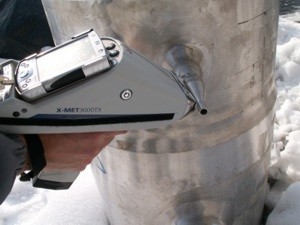Positive Material Identification (PMI)

Positive Material Identification - PMI, is an integral part of process safety management in the petroleum refining and petrochemical industries. As a result of a series of accidents due to material mix-ups, many companies have instituted stringent PMI programs. Industry organizations have also worked to develop guidelines to assure that the nominal compositions of all alloy components in a process system are consistent with design specifications.
Positive Material Identification is a chemical composition which checks materials mostly on pipelines, vessels or machinery and welds due to imperfections and non-conformity with project documentation or standards. We have various types of equipment (Texas Nuclear, X-MET 3000TX) and offer complete testing services.
PMI is particularly important where the correct grade of material is critical for a particular capital installation or project where the use of the material is being stretched to the limits.

In X-ray fluorescence spectroscopy, the surface of the material is subjected to the brief radiation of an X source. The atoms of each element in the metal undergoing the test are caused to glow and emit secondary X-rays characteristic of the element. A detector segregates these X-rays into categories of energy and, by measuring their intensity in each region, determines the element concentration. Microprocessor based systems provide an accurate on-site identification and quantitative elemental analysis of alloys, with a direct readout of alloy type, analyzed element and percent of concentration.
PMI is mostly required in:
- petrochemical and chemical pipeline components, valves, parts of vessels, welds, bolts
- checking of aerospace castings, fasteners, elements of fuselage and engines
- plant inspection and failure analysis
- incoming and in-stock materials
- selecting scrap metals


